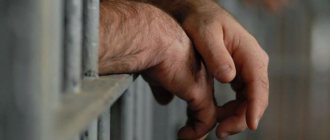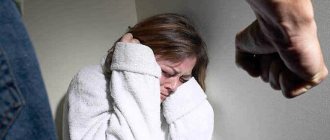Article 118 of the Criminal Code of the Russian Federation “Causing grievous harm to health through negligence” contains 2 parts. There is a very lenient punishment for this crime. They won't send you to a colony. But there are other unpleasant things:
- a criminal record that greatly spoils life;
- under Part 2 of Article 118 of the Criminal Code of the Russian Federation “Causing grievous harm to health through negligence,” the court may prohibit engaging in certain activities. For example, if a doctor made a medical mistake, the court may well prohibit him from engaging in medical activities for a period of no more than 3 years. More on this below.
It is important to know: this is why you need the help of an experienced criminal lawyer. There is an opportunity to legally evade criminal liability under Article 118 of the Criminal Code of the Russian Federation; this will also be discussed below. And if there is no criminal liability, then there will be no criminal record, there will be no punishment. And all this is completely legal.
In addition, a lawyer is a constant moral support. It is very uncomfortable to answer the investigator’s questions one on one when no one is protecting you. It is also of great importance that you can always ask the lawyer a question about some unclear point in the case. You must understand the meaning of everything that happens. This will make you feel confident. Without a lawyer there will be no certainty.
What is the crime under Article 118 of the Criminal Code of the Russian Federation and how much can you get for it?
Part 1 of Article 118 of the Criminal Code of the Russian Federation “Infliction of grievous harm to health through negligence” is to cause grievous harm to the health of one person without intending to do so. For this you can get:
- fine up to 80,000 rubles;
- compulsory work up to 480 hours;
- correctional labor for up to 2 years;
- restriction of freedom for up to 3 years;
- arrest for up to 6 months, but this type of punishment is not currently applied in the Russian Federation, because there are no houses of arrest.
It turns out that the most severe punishment under Part 1 of Article 118 of the Criminal Code of the Russian Federation “Causing grievous harm to health through negligence” is restriction of freedom for up to 3 years.
It is important to know: restriction of freedom is not deprivation of freedom at all. A restriction is a ban on attending certain events (sports, usually, for example, football matches), traveling outside the locality, and the like.
Part 2 of Article 118 of the Criminal Code of the Russian Federation “Causing grievous harm to health through negligence” is already more complicated. The crime here would be causing grievous bodily harm due to improper performance of official duties. That is, a person has some official duties, he performs them incorrectly or does not perform them at all, and because of this, another person suffers serious harm to his health. For this you can get:
- restriction of freedom for up to 4 years;
- forced labor for up to 1 year with deprivation of the right to engage in certain activities for up to 3 years;
- forced labor for up to 1 year without deprivation of the right to engage in certain activities;
- imprisonment for up to 1 year with deprivation of the right to engage in certain activities for up to 3 years;
- imprisonment for up to 1 year without deprivation of the right to engage in certain activities.
Differences in the subjective side (different forms of guilt)
The crime provided for in Article 111 of the Criminal Code of the Russian Federation is committed intentionally, that is, directly (the person is aware that he is committing an action/inaction that is dangerous to the health of another person, foresees the possibility or inevitability of causing serious harm to his health and desires its occurrence) or indirect (the person is aware that commits an act dangerous to the health of another person, foresees the possibility of causing serious harm to his health, does not want, but consciously allows such harm to be caused or is indifferent to the fact of its causing) with intent.
The crime provided for in Article 118 of the Criminal Code of the Russian Federation is committed through negligence, that is, through frivolity (if the person foresaw the possibility of socially dangerous consequences of his actions/inaction, but without sufficient grounds, he arrogantly counted on preventing these consequences) or through negligence (if the person did not foresee the possibility of socially dangerous consequences of its actions/inaction, although with the necessary care and forethought it should and could have foreseen these consequences).
Only a specialist with a sufficient amount of practical experience and knowledge can determine the actual presence or absence of a particular crime in the actions/inaction of the accused/suspect, the correctness of the qualification of the act under a particular article of the Criminal Code of the Russian Federation, and the possibility of reclassifying the act. In this regard, it is advisable to seek help from a lawyer immediately, since a timely request can also help to terminate the criminal case.
What is grievous bodily harm and what does “by negligence” mean?
Now let's figure out what serious harm is and how it is determined. There are rules for determining the severity of harm caused to human health. They were approved by Decree of the Government of the Russian Federation dated August 17, 2007 No. 522. These rules say that serious harm to human health is:
- life-threatening harm (head wound, intracranial injury, neck wound, chest wound, dislocation of the thoracic vertebra and other serious wounds and injuries);
- loss of speech, vision, hearing, as well as any organ or loss of its functions;
- abortion;
- mental disorder;
- drug addiction or substance abuse;
- permanent facial disfigurement;
- significant persistent loss of general ability to work by at least ⅓;
- complete loss of professional ability to work.
So, any of these injuries is considered serious harm to health. The severity of harm to health is determined by a forensic medical examination. It is carried out in accordance with the order of the Ministry of Health and Social Development of the Russian Federation dated May 12, 2012 No. 346n.
What does “by negligence” mean? Simply put, this means that the person did not want to harm anyone. Didn’t plan, didn’t plan, as lawyers say “didn’t have intent.” But it turned out that someone was injured, and seriously injured. Article 26 of the Criminal Code of the Russian Federation says that there are two types of negligence - frivolity and negligence.
What is frivolity?
Frivolity is when a person realized that his actions could cause bad consequences, but hoped that this would not happen.
An example from practice: citizen A. had an argument late at night at a kiosk with citizen B. The latter began to attack A. with a knife. A. picked up a metal stick that was lying nearby, began to swing it at B. and had every right to do so. However, citizen V. was nearby, who wanted to stop B. and for this purpose tried to restrain him. A. accidentally hit her on the head with a metal pipe and caused serious injury - grievous harm to health.
In general, A. had the right to defend himself from B.’s attack; there can be no other opinion. But there was no need to hit another person on the head. There is levity here. This is part 1 of article 118 of the Criminal Code of the Russian Federation.
What is negligence?
Negligence is when a person did not foresee that his actions could lead to trouble, but could and should have foreseen.
Example: citizen M. drove his car into a repair bay at a car service center. Service employee K. was in front of the car. M. mixed up the pedals and pressed K. against the wall with the front of the car. The employee suffered serious injury.
It was negligence: if the driver had not mixed up the pedals (and he might not have mixed them up), then everything would have been fine.
About part 2 of article 118 of the Criminal Code of the Russian Federation.
It is a crime to cause serious harm to human health due to improper performance of professional duties. These professional responsibilities can be in the form of instructions, safety precautions, labor protection rules, and other documents.
Example : citizen N. is a foreman of the electrical network section of a transformer substation. According to the job description and “Safety Rules...” he was obliged to ensure that there were warning signs on his site and that the door to the second floor room was not closed. But he didn't. There were no signs, and the door did not close.
As a result of this, minor K., having climbed into the substation, received an electric shock and burns because his clothes caught fire. This is serious harm to health, part 2 of article 118 of the Criminal Code of the Russian Federation.
Expertise
In cases provided for in Art. 111 of the Criminal Code of the Russian Federation and Article 118 of the Criminal Code of the Russian Federation (Article 109 of the Criminal Code of the Russian Federation, Article 105 of the Criminal Code of the Russian Federation, etc.) it is mandatory to conduct a forensic medical examination, since only a forensic expert or a commission of experts can determine the nature of the victim’s bodily injuries, the mechanism and duration of their formation, the causal relationship between the actions of the suspect/accused and the victim’s bodily injuries, the location of the injuries and the degree of severity, whether the injuries were received posthumously or intravitally. In this case, the expert is often provided not only with the victim and his medical record, but sometimes with a video recording and materials of the criminal case in whole or in part, including the testimony of the suspect/accused. In this regard, it may be important and necessary to file a petition and conduct additional interrogation of the suspect/accused before scheduling the examination.
When determining the degree of severity, experts are currently guided, among other things, by the Decree of the Government of the Russian Federation dated August 17, 2007 N 522 (as amended on November 17, 2011) “On approval of the Rules for determining the degree of severity of harm caused to human health” and the Order of the Ministry of Health and Social Development of the Russian Federation dated April 24, 2008 N 194n (as amended on January 18, 2012) “On approval of Medical criteria for determining the severity of harm caused to human health” (registered with the Ministry of Justice of the Russian Federation on August 13, 2008 N 12118).
Various types of forensic medical examinations of material evidence can be assigned to conduct molecular genetic or medical forensic, forensic biochemical, cytological and other types of research. Sometimes, in order to establish the truth in a case, forensic biological, forensic chemical and other necessary examinations are prescribed.
An examination is ordered by an investigator or a court, including when a lawyer submits a substantiated request for the need to conduct a particular study. It is necessary to carefully read the decisions on the appointment of examinations, since they indicate the questions that the expert will need to answer. A timely, well-founded request to raise a particular issue with an expert can contribute to the timely clarification of the essential circumstances of the case.
To clarify this conclusion, the expert may be questioned at the request of the defense. The Code of Criminal Procedure of the Russian Federation provides for the possibility of requesting a repeat or additional forensic examination of the case.
Medical errors need to be discussed separately.
This is the most complex type of case under Part 2 of Article 118 of the Criminal Code of the Russian Federation “Causing grievous harm to health through negligence.” The difficulty stems from the fact that medical activities are very specific. Sometimes the doctor is forced to make a decision “here and now,” but there is no necessary information about the patient’s condition. And a lot can be interpreted in different ways.
Example . Pregnant S. was admitted to the maternity hospital. The attending physician D. knew that S. had pregnancy pathologies - weakness of labor and others. D. should have understood that vaginal birth would be dangerous for the newborn. But that’s exactly how the birth went – through natural means. As a result, the newborn suffered serious harm to his health, and D. was convicted.
However, the court could have acquitted D., since her arguments were serious: she indicated in court that the method of birth did not harm the child. The condition of the healthy newborn was already deplorable, since there were infections, hypoxia, pneumonia, cerebral edema and other pathologies.
It is important to know: the investigation and the court are initially set on a guilty verdict. To avoid it, you need the help of an experienced criminal lawyer. Defense during investigation and trial is a complex and tricky business. This requires professional knowledge.
How to prove unintentionality of actions?
To prove the unintentionality of the crime committed by the culprit, he needs to prove that, while causing damage to the health of the victim (through blows, a strong push, etc.), he did not understand the seriousness of the consequences.
This may be indicated by the domestic nature of the act. For example, during an argument that escalated into a conflict, a man pushed his pregnant wife, as a result of which she lost her unborn child.
The perpetrator had no intention to terminate her pregnancy, but due to the conflict, he could not restrain his emotions, and as a result, he caused grievous harm through negligence.
An important role in the trial will be played by the testimony of witnesses who could confirm that the damage was caused to the victim spontaneously , that the criminal did not commit any pre-prepared actions. The absence of a crime plan also indicates that it was committed unintentionally.
Opportunities to evade criminal liability and more good news
Both parts of Article 118 of the Criminal Code of the Russian Federation “Causing grievous harm to health through negligence” are crimes of minor gravity. Title IV of the Criminal Code allows you to legally evade criminal liability.
It is important to know: criminal liability and criminal punishment are two different things. It is better to avoid responsibility, and not just punishment, with the help of a criminal lawyer. If you are released from criminal liability, there will be no criminal record. And if you are released only from punishment, there will be a criminal record - and with it all the negative consequences.
So, the specific opportunities to avoid responsibility are as follows.
Exemption from criminal liability in connection with active repentance - Article 75 of the Criminal Code of the Russian Federation: If a crime under Article 118 of the Criminal Code of the Russian Federation “Causing grievous harm to health through negligence” was committed for the first time, no crimes were committed before, then the court can exempt from criminal liability. A few more conditions must be met:
- voluntarily confess and write a statement to the police;
- help the investigator solve the crime, not hide anything;
- compensate the victim for damages. This includes treatment costs and moral damages.
Article 76 Exemption from criminal liability in connection with reconciliation with the victim: If reconciliation is made with the victim, the court can also exempt from criminal liability. But at the same time, it is also necessary to make amends for the harm caused: treatment costs, as well as pay compensation for moral damage.
The good news is that the court cannot send to prison a person who has committed a minor crime for the first time without aggravating circumstances. This is prohibited by Article 56 of the Criminal Code of the Russian Federation.
It is important to know: it may seem that everything is simple and unambiguous. In practice this is not the case. At any moment, some circumstance may arise that will prevent you from using Articles 75 or 76 of the Criminal Code of the Russian Federation. And in general, the court is not obliged to exempt from liability, even if the conditions set by Articles 75 and 76 of the Criminal Code of the Russian Federation are met. The court has the right to do this, but is not obliged. To ensure everything goes smoothly, you need the participation of an experienced criminal lawyer.
What does our lawyer do to protect you?
- The main task of a criminal lawyer is to handle the case so that you receive the least possible punishment or no punishment at all. This is exactly how our lawyers see their task.
- A lawyer is present during interrogations and does not allow the investigator to ask leading questions and put pressure on you.
- The lawyer is seeking the appointment of an independent examination. This is very important because the results of the examination often form the basis of the verdict.
- The lawyer makes sure that the testimony of defense witnesses does not disappear in the case. This happens sometimes. There was a witness - and there is no witness.
- The lawyer quickly responds to attempts to make changes to the case: change the dates of interrogations, decisions, examinations and other actions. Sometimes there are cases when completely extraneous documents are inserted into the case. Yes, this is not done often. But sometimes it happens.
- And also, a criminal lawyer will always provide you with moral support and give good advice.
Services of our lawyers
- free legal advice on Article 118 of the Criminal Code of the Russian Federation “Causing grievous harm to health through negligence”;
- studying the case, forecasting prospects;
- analysis of defense methods specifically for your case, choosing the best, creating a defense strategy;
- carrying out all necessary procedural actions on your behalf;
- preventing violation of your rights during the investigation process;
- representation in court.
We are not hiding anything from you. Yes, going to jail under Article 118 of the Criminal Code of the Russian Federation “Causing grievous bodily harm through negligence” is almost impossible. Most likely, the court will give either a less severe sentence or a suspended sentence.
The point is different - under Part 2 of Article 118 of the Criminal Code of the Russian Federation, the accused may be prohibited from engaging in professional activities for 3 years. For example, a doctor who made a medical error should work in the medical field. To prevent this from happening, you need a good criminal lawyer.
And of course, a criminal record. You should try your best to avoid it. To do this, you need to legally escape criminal liability , and only an experienced criminal lawyer can help you here.
So come for a free consultation. Ask questions, feel confident and supported - it’s not all that scary. Consultations are completely free and do not obligate you to anything. Leave a message in the form below or call yourself. In this situation, you need to act, and the sooner the better.
Definition of harm
Before turning to the article itself, it is worth understanding what the definition of harm entails. In relation to criminal liability, harm is damage that was caused to a citizen with bodily injury.
Bodily injuries include:
- violation of the integrity of the human body;
- violation of the integrity of the skeleton;
- impact on the functions of the body responsible for its vital activity.
In addition, damage may include diseases or pathological conditions resulting from the damage.





